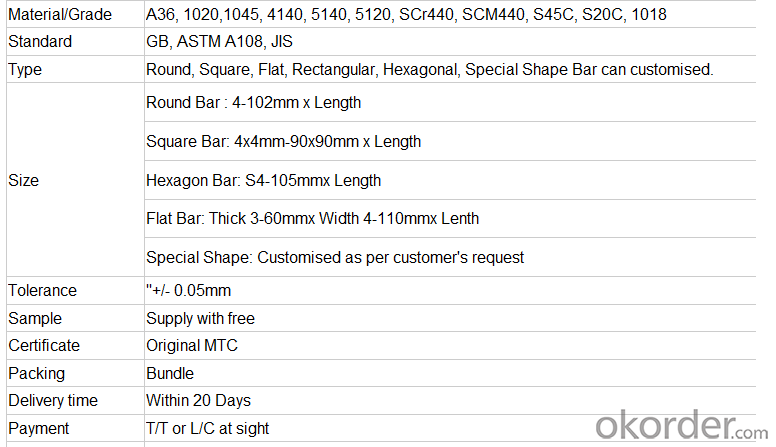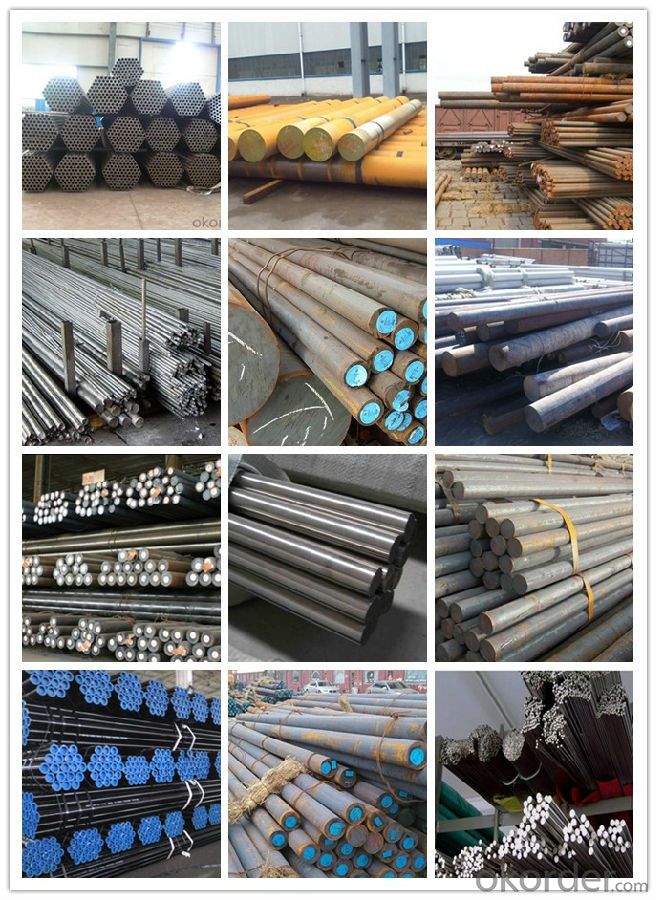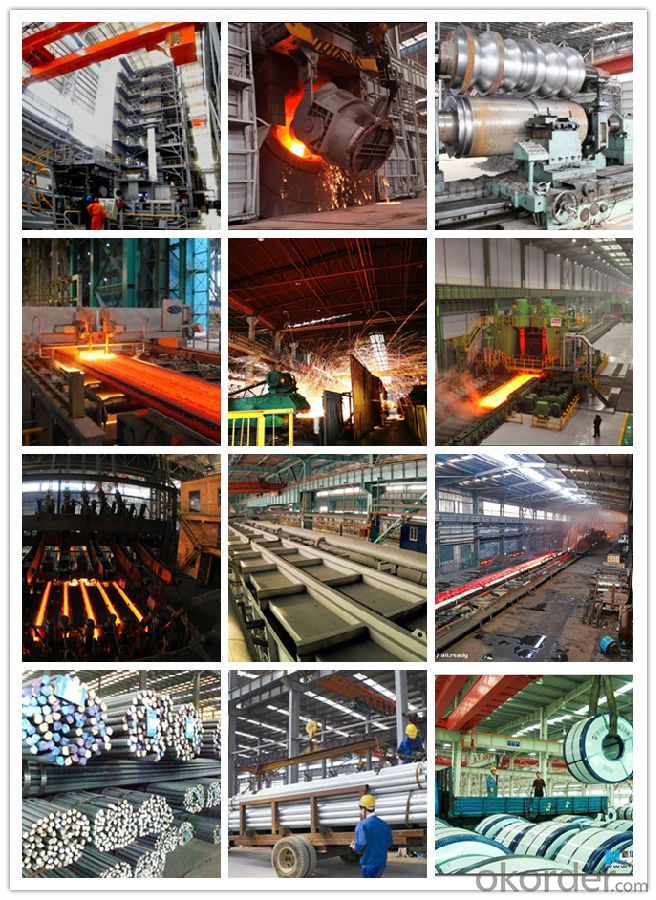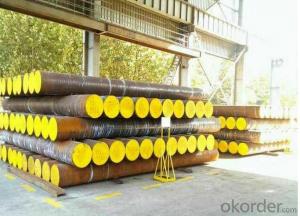Cold Drawn Hexagonal Steel Bar 4140 5140
- Loading Port:
- China main port
- Payment Terms:
- TT OR LC
- Min Order Qty:
- 25 m.t.
- Supply Capability:
- 1000 m.t./month
OKorder Service Pledge
OKorder Financial Service
You Might Also Like
Item specifice
Cold drawn hexagonal Steel Bar 4140 5140
Product information
1. Produce Standard: GB, AISI, ASTM, SAE, EN, BS, DIN, JIS
2. Produce processes: Smelt Iron -EAF smelt Billet - ESR smelt Billet -Hot rolled or forged get the steel round bar and plate
3. Heat treatment: Normalized / Annealed / Quenched+Tempered
4. Quality assurance: All order we can received third party inspection, You can let SGS, BV,.. and others test company test and inspect our products before Goods shipping.
Product detail

Product show

Work shop

Our Services
* Welcome to contact us with your detailed inquiry, you will be replied within 24 hours.
* You are promised to obtain the best quality, price and service.
* We'd like to provide samples for your confirm.
- Q:How does special steel contribute to the production of precision instruments?
- Special steel contributes to the production of precision instruments by offering high strength, durability, and resistance to corrosion. It provides the necessary stability and precision required for the manufacturing of sensitive components such as gears, bearings, and springs. Additionally, special steel's excellent machinability allows for intricate designs and precise shaping, ensuring the accuracy and reliability of the final product.
- Q:How is free-cutting steel used in the manufacturing of screws and bolts?
- Free-cutting steel is used in the manufacturing of screws and bolts due to its exceptional machinability. It contains elements such as sulfur, phosphorus, lead, or selenium that act as lubricants during the cutting and machining process. These elements help to break the chips and reduce the friction between the metal and the cutting tool, resulting in improved efficiency and reduced tool wear. This type of steel enables faster production rates and higher precision in screw and bolt manufacturing.
- Q:Can special steel be coated?
- Yes, special steel can be coated. Coating special steel provides several benefits such as corrosion resistance, improved aesthetics, increased durability, and enhanced functionality. There are various coating materials and techniques available for special steel, including but not limited to electroplating, hot-dip galvanizing, powder coating, and ceramic coating. These coatings help protect the steel from environmental factors, chemical exposure, and wear and tear, thereby extending its lifespan and maintaining its performance. Additionally, coatings can also be customized to provide specific properties like non-stick surfaces, heat resistance, or anti-microbial properties, depending on the intended application of the special steel.
- Q:What are the different coating techniques for special steel parts?
- There are several different coating techniques that can be used for special steel parts. Some common ones include electroplating, powder coating, thermal spraying, and chemical vapor deposition. Each technique offers unique advantages and is chosen based on factors such as the desired coating properties, cost, and application requirements.
- Q:How does special steel contribute to reducing product lead times?
- Special steel contributes to reducing product lead times by offering several advantages. Firstly, special steel is known for its high strength and durability, allowing manufacturers to produce parts that can withstand harsh conditions and heavy usage. This ensures that the products made with special steel have a longer lifespan, reducing the need for frequent repairs or replacements. Secondly, special steel can be fabricated into complex shapes and sizes, enabling manufacturers to produce intricate components with high precision. This eliminates the need for additional machining processes, saving time and reducing lead times. Lastly, special steel often has improved mechanical properties, such as higher hardness or heat resistance, which can enhance the performance of the final product. This allows manufacturers to meet specific requirements and deliver high-quality products more efficiently, ultimately reducing lead times.
- Q:How does special steel perform in tooling applications?
- Special steel performs exceptionally well in tooling applications due to its high strength, durability, and resistance to wear and abrasion. It is specifically designed to withstand the demanding conditions of tooling environments, such as cutting, shaping, and forming various materials. The unique properties of special steel, including its excellent hardness and toughness, make it an ideal choice for producing reliable and long-lasting tools that can efficiently handle heavy workloads and maintain their performance over time.
- Q:Can special steel be used in the solar panel manufacturing industry?
- Yes, special steel can be used in the solar panel manufacturing industry. It is commonly used for the frames and supports of solar panels due to its high strength, durability, and corrosion resistance properties. Special steel helps to ensure the structural integrity and longevity of solar panels, making it an essential material in the industry.
- Q:Can special steel be used in the appliance manufacturing industry?
- Yes, special steel can be used in the appliance manufacturing industry. Special steels, such as stainless steel or high-strength steel, offer various advantages such as corrosion resistance, durability, and enhanced mechanical properties. These qualities make them suitable for manufacturing appliances that require high performance, such as refrigerators, ovens, or washing machines. Additionally, special steels can be customized to meet specific design requirements and can contribute to the overall aesthetic appeal of the appliances.
- Q:What are the different manufacturing processes used for special steel?
- Special steel can be manufactured using various processes, depending on the desired properties and requirements for the final product. Some commonly used manufacturing processes for special steel include: 1. Electric Arc Furnace (EAF): Stainless steel, tool steel, and alloy steel can be produced by melting scrap metal in an electric arc furnace. This involves passing high electrical current through the electrodes to melt the metal. 2. Basic Oxygen Furnace (BOF): Carbon and low-alloy steels are commonly produced using the BOF process. It involves combining molten iron from a blast furnace with scrap metal and blowing oxygen through the mixture to remove impurities. 3. Vacuum Degassing: To eliminate impurities like hydrogen, nitrogen, and sulfur from steel, a vacuum environment is used in the vacuum degassing process. This is often employed to produce high-quality and ultra-clean special steels. 4. Continuous Casting: Molten steel is poured into a water-cooled mold in the continuous casting process, allowing it to solidify into a continuous strand. This helps in producing steel with consistent shape, size, and internal structure, and is commonly used for semi-finished products like billets, slabs, and blooms. 5. Powder Metallurgy: Special steels with specific properties, such as high strength, wear resistance, or corrosion resistance, can be produced using powder metallurgy. This process involves compacting metal powders into the desired shape and then sintering them at high temperatures to bond the particles together. 6. Heat Treatment: Modifying the microstructure and properties of special steels can be achieved through heat treatment processes like annealing, quenching, and tempering. These processes involve heating the steel to specific temperatures and then cooling it in a controlled manner to achieve desired hardness, toughness, and other mechanical properties. Each of these manufacturing processes has its own advantages and limitations, and the choice of process depends on factors such as the required type of steel, desired properties, and cost-effectiveness for a specific application.
- Q:Can special steel be used for food processing equipment?
- Yes, special steel can be used for food processing equipment. Special steel, such as stainless steel, is commonly used in the food industry due to its excellent corrosion resistance, durability, and hygienic properties. It is resistant to rust, staining, and bacterial growth, making it ideal for food processing equipment where cleanliness and safety are crucial.
1. Manufacturer Overview |
|
|---|---|
| Location | |
| Year Established | |
| Annual Output Value | |
| Main Markets | |
| Company Certifications | |
2. Manufacturer Certificates |
|
|---|---|
| a) Certification Name | |
| Range | |
| Reference | |
| Validity Period | |
3. Manufacturer Capability |
|
|---|---|
| a)Trade Capacity | |
| Nearest Port | |
| Export Percentage | |
| No.of Employees in Trade Department | |
| Language Spoken: | |
| b)Factory Information | |
| Factory Size: | |
| No. of Production Lines | |
| Contract Manufacturing | |
| Product Price Range | |
Send your message to us
Cold Drawn Hexagonal Steel Bar 4140 5140
- Loading Port:
- China main port
- Payment Terms:
- TT OR LC
- Min Order Qty:
- 25 m.t.
- Supply Capability:
- 1000 m.t./month
OKorder Service Pledge
OKorder Financial Service
Similar products
New products
Hot products
Related keywords






























